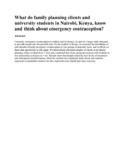| dc.contributor.author | Muia, E. | |
| dc.contributor.author | Ellertson, C. | |
| dc.contributor.author | Clark, S. | |
| dc.contributor.author | Lukhando, M. | |
| dc.contributor.author | Elul, B. | |
| dc.contributor.author | Olenja, J. | |
| dc.contributor.author | Westley, E. | |
| dc.date.accessioned | 2013-05-15T09:02:18Z | |
| dc.date.available | 2013-05-15T09:02:18Z | |
| dc.date.issued | 2000-04 | |
| dc.identifier.citation | Afr J Reprod Health | en |
| dc.identifier.uri | http://www.ncbi.nlm.nih.gov/pubmed/11000711 | |
| dc.identifier.uri | http://erepository.uonbi.ac.ke:8080/xmlui/handle/123456789/23056 | |
| dc.description.abstract | Currently, emergency contraception is seldom used in Kenya. As part of a larger study designed to provide insight into the possible roles for the method in Kenya, we assessed the knowledge of and attitudes towards emergency contraception in two groups of potential users, and we focus on these data specifically in this paper. We interviewed clustered samples of clients at ten family planning clinics in Nairobi (n = 282) and conducted four focus group discussions with students at two universities in Kenya (n = 42). Results show that despite relatively low levels of awareness and widespread misinformation, when the method was explained, both clients and students expressed considerable interest, but also expressed some health and other concerns | en |
| dc.language.iso | en | en |
| dc.publisher | . | en |
| dc.relation.ispartofseries | vol. 4(1):77-87 (2000); | |
| dc.title | What do family planning clients and university students in Nairobi, Kenya, know and think about emergency contraception? | en |
| dc.type | Article | en |
| local.publisher | Department of Community Health, University of Nairobi | en |

